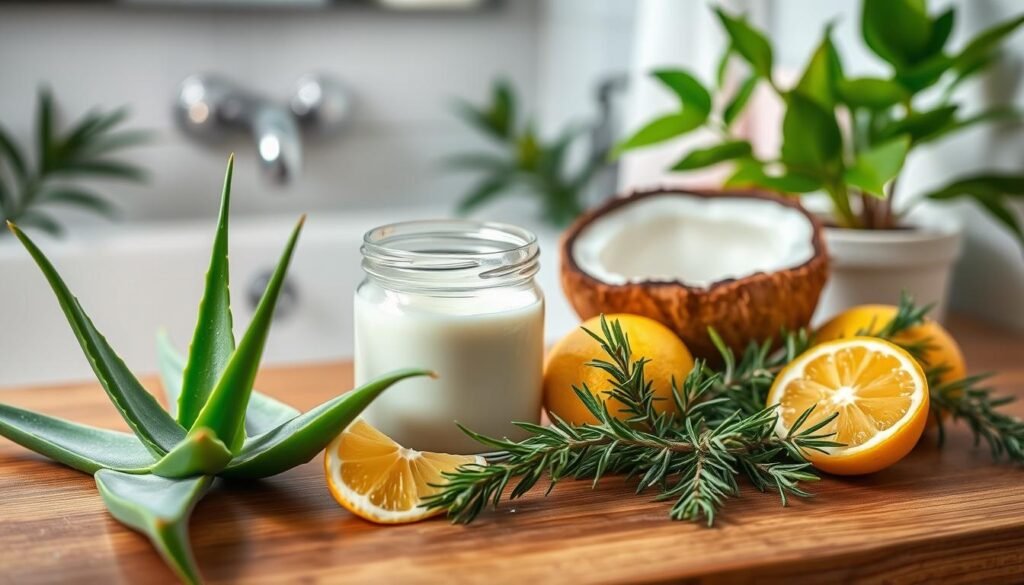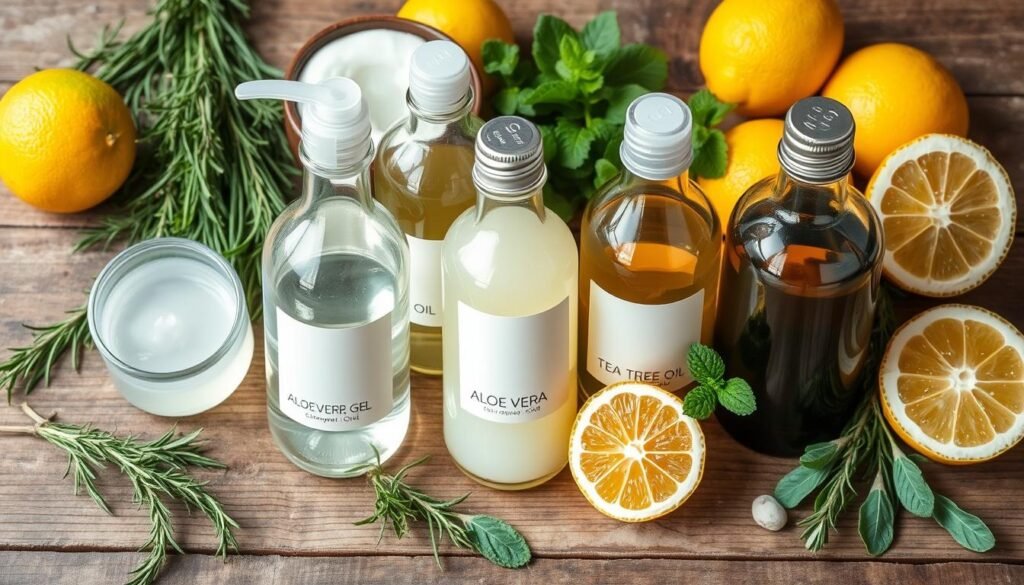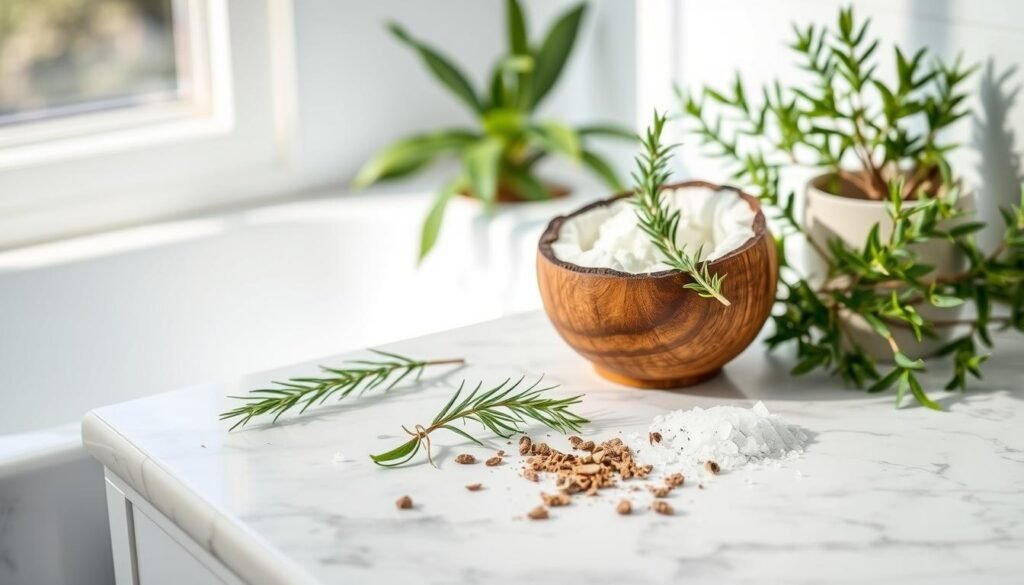Did you know that around 50% of the population experiences dandruff at some point? This common scalp issue is more than just an annoyance. It can really affect how you feel about yourself. Knowing why it happens is key to dealing with it.
Want to tackle dandruff using natural methods? You’re in the right place. This guide covers everything from spotting symptoms to scalp and hair care tips. With these home remedies, you can beat those embarrassing flakes for good. Get ready to enjoy a healthy scalp again.
Key Takeaways
- Natural remedies can significantly improve dandruff symptoms.
- Regular scalp care is crucial for maintaining a healthy scalp.
- Effective home treatments include aloe vera, coconut oil, and apple cider vinegar.
- Understanding the causes of dandruff helps in choosing the right treatment.
- Routine hygiene can prevent exacerbation of dandruff symptoms.
- Stress management is essential in reducing dandruff flare-ups.
Understanding Dandruff and Its Causes
Dandruff can be annoying, with visible flakes on your scalp and shoulders. Learning about what dandruff is and its varied causes helps tackle it well.
What is Dandruff?
Dandruff is marked by yellowish flakes on an oily scalp, called pityriasis simplex capillitii in medical terms. It mostly starts in young adulthood and may last into middle age. Some people experience it even in their older years. Although men are more often affected, it’s common across the population, especially among teenagers.
Common Causes of Dandruff
Several factors lead to dandruff, the most common being:
- Fungal Overgrowth: Too much Malassezia yeast causes lots of flaking.
- Seborrheic Dermatitis: This condition brings red, greasy skin patches and big flakes.
- Conditions Affecting the Immune System: Illnesses like Parkinson’s and HIV can make dandruff worse.
- Dry Skin: Less moisture means smaller, dry flakes appear.
Distinguishing Between Dandruff and Dry Scalp
Knowing the difference between dandruff and dry scalp is key for the right treatment. Dandruff is about large, oily flakes from skin issues. Dry scalp, on the other hand, has small, white flakes from lack of moisture. This knowledge helps pick the best management options. For ongoing symptoms, getting advice from a pro is wise. For deeper understanding, check out more on dandruff treatments.
How to Identify Dandruff Symptoms
Knowing how to spot dandruff symptoms helps in tackling it early. It’s common to have an itchy head and see flakes. These flakes might look different from person to person. Getting to know these signs can lead to the right treatment and knowing when to get help.
Symptoms of Dandruff
The main signs of dandruff are:
- Itchy scalp: Dandruff often makes your head feel itchy, which is bothersome.
- Flaky skin: You’ll usually see white or yellow flakes in your hair and on your clothes.
- Oily patches: Sometimes, the scalp will have big, oily flakes because it’s making too much oil.
When to Seek Medical Advice
If dandruff doesn’t get better with regular treatments or gets worse, see a doctor. Certain symptoms mean you should get medical advice soon. These include:
- Severe itching: Really bad itching that stops you from doing your daily stuff could mean a bigger issue.
- Persistent flakes: Dandruff that doesn’t go away with normal shampoos might need a prescription treatment.
- Underlying issues: If you have a weak immune system or skin problems, you might need special attention for conditions like seborrheic dermatitis.
To deal with dandruff well, it helps to find out what causes it for you. Paying attention to your symptoms helps manage this common problem.
Effective Dandruff Treatment at Home
Dandruff is common but can be easily managed at home. Homemade remedies, special shampoos, and smart hair care steps are crucial. They help control dandruff and improve scalp health.
Homemade Remedies with Natural Ingredients
A lot of people beat dandruff with homemade remedies. They use simple things like aloe vera, honey, and apple cider vinegar. These natural ingredients soothe the scalp and keep it balanced.
Using Anti-Dandruff Shampoo
If home remedies don’t work, try an anti-dandruff shampoo. Pick ones with ketoconazole or salicylic acid. Using them regularly fights the fungus responsible for dandruff. Washing your scalp often also helps by keeping it clean.
Complementary Hair Care Tips
Keeping up with your hair care routine is key to fighting dandruff. Gentle brushing and mild products help your scalp stay healthy. Lowering stress also helps since stress can make dandruff worse. For more tips on taking care of your scalp, check out this resource.
Natural Remedies for Dandruff Relief
Many people have found success with natural remedies for dandruff. They use ingredients known for their healing effects. These remedies improve scalp health and offer relief from itching.
Aloe Vera for Soothing the Scalp
Aloe vera is known for its moisturizing and anti-inflammatory properties. It has been proven to reduce the symptoms of seborrheic dermatitis. Using aloe vera gel regularly can calm and hydrate an irritated scalp.
Apple Cider Vinegar for pH Balance
Apple cider vinegar is praised for balancing scalp pH. It closes cuticles, enhancing hair look and controlling oil production. Many see less flakiness and dryness by using apple cider vinegar in their hair care.
Coconut Oil for Moisturizing and Anti-Inflammatory Benefits
Coconut oil is a great natural moisturizer with anti-inflammatory benefits. Studies show it can significantly reduce skin irritation. Including this oil in hair care routines promotes a healthy, itch-free scalp.

| Natural Remedy | Benefits | Application Frequency |
|---|---|---|
| Aloe Vera | Soothes irritated scalp, reduces inflammation | 2-3 times/week |
| Apple Cider Vinegar | Restores pH balance, reduces flakiness | Every wash or 2-3 times/week |
| Coconut Oil | Moisturizes, anti-inflammatory effects | 2-3 times/week |
How Baking Soda Can Help with Dandruff
Baking soda is seen as a potential dandruff solution. Its natural exfoliant abilities help remove scalp impurities. Learning to use it right can ease dandruff and boost scalp health.
Benefits of Baking Soda as an Exfoliant
Baking soda clears dirt, oil, and dead skin as a gentle exfoliant. Studies show its antifungal traits combat dandruff causes. A 2013 study found it cuts fungal growth, a flaking trigger.
Those with itchiness, like psoriasis sufferers, may find relief with baking soda. A 2005 study with 31 people backed this benefit.
Application Tips for Baking Soda Treatment
To benefit from baking soda against dandruff, use a diluted mix. Follow these application tips:
- Mix one tablespoon of baking soda with a cup of water for a diluted solution.
- Put the mix directly on the scalp, focusing on flaky spots.
- Let it sit a few minutes for effective scalp penetration.
- Rinse well with lukewarm water, leaving no residue.
While it’s effective, bake soda should be used in moderation. Too much can harm the scalp’s pH balance. The scalp is usually at pH 5.5, whereas baking soda is pH 9.
Adding baking soda to your hair care might fight dandruff. However, considering anti-dandruff shampoos as another option is advised. They avoid the overuse risks baking soda carries.
Homemade Shampoos and Rinses
Making your own shampoos is a gentle way to fight against dandruff. You can avoid harsh chemicals found in store-bought products. These natural cleansers not only help with dandruff. They also nourish your hair and scalp.
Making Honey-Based Hair Cleansers
Honey-based hair cleanser is great for those wanting a natural solution. Honey fights the bacteria causing dandruff. Mix it with water to create a soothing solution.
Massage it into your scalp to help moisture stay and fight flaky skin. It also boosts blood flow and promotes healthy hair.
Creating a Rye Flour Shampoo
Rye flour shampoo is a simple, gluten-free option. It cleans your scalp well and is easy on the wallet. Mix rye flour with water until it’s paste-like.
Apply it to your scalp and rinse well for a refreshed feeling. Rye flour is a natural substitute for chemical shampoos.
| Homemade Shampoo Ingredients | Function |
|---|---|
| Apple Cider Vinegar | Anti-fungal, limits bacteria production |
| Castor Oil | Moisturizes and nourishes the scalp |
| Argan Oil | Rich in nutrients, enhances scalp health |
| Wheat Germ Oil | Supports healthy hair growth |
| Tea Tree Essential Oil | Anti-fungal properties |
| Lavender Essential Oil | Soothes irritation and promotes relaxation |
Homemade shampoos can fit any hair type. Try different ingredient amounts to see what works best. These natural options offer a way to control dandruff without commercial products. Check out this guide for more on making your own dandruff shampoo.

Essential Oils for Flaky Scalp Solutions
Many people now prefer natural remedies for dandruff. Essential oils are a top choice. They tackle dandruff and boost scalp health. Tea tree and rosemary oils are particularly effective.
Benefits of Tea Tree Oil for Scalp Health
Tea tree oil is known for fighting fungus, a common cause of dandruff. Studies prove it’s effective. It not only fights fungus but also soothes the scalp. Just mix a few drops with another oil for a calming massage. Or, add it to your shampoo for an extra-clean feel.
Using Rosemary Oil for Dandruff Prevention
Rosemary oil is great for better blood flow to the scalp. It helps create a healthy environment for hair. Using it regularly can help prevent dandruff. Mix it with a carrier oil or add it to hair masks for best results.
Dandruff Prevention Strategies
Preventing dandruff means keeping your scalp clean and avoiding things that irritate it. A healthy scalp can reduce dandruff symptoms. It’s important to look after it well.
Maintaining Regular Scalp Hygiene
Good scalp hygiene is key to stopping dandruff. It’s crucial to keep the scalp clean to prevent oil and product buildup. This stops dandruff from starting. Washing your hair with gentle shampoos helps. Make sure to rinse out all the products well. Choose shampoos made for keeping the scalp healthy. They contain ingredients that fight fungus and reduce swelling. This helps keep the scalp clear.
Identifying and Avoiding Irritants
Knowing what irritates your scalp is important for dandruff prevention. Stay away from harsh chemicals, sulfates, and alcohol in haircare products. They can make the scalp more irritated and worsen dandruff. Look for products that are gentle and moisturizing instead. Pay attention to how your scalp reacts to different products. Doing a patch test with new products can alert you to bad reactions. This helps keep your scalp in good shape.

How Lifestyle Changes Can Reduce Dandruff
Lifestyle factors greatly influence dandruff severity. By managing stress and eating well, you can see better scalp health.
Managing Stress as a Trigger
Stress strongly leads to more dandruff. It can make scalp problems worse if not handled. Reducing stress through meditation, exercise, or hobbies can help greatly.
Adding relaxation techniques to your day promotes a healthier scalp.
Importance of a Healthy Diet
Eating right is key for skin and scalp health. Include fruits, veggies, and omega-3s in your diet to fight dandruff.
Antioxidant-rich foods reduce inflammation and staying hydrated keeps the scalp moist. Following dietary advice, like eating zinc and biotin, supports healthy hair.
Conclusion
Dandruff is a common scalp problem that affects many people. It shows up as white flakes, coming from dead skin cells. Knowing why it happens is key to finding the right dandruff treatment at home. For example, a fungus called Malassezia or using harsh hair products can cause it.
Using natural remedies, like tea tree oil, coconut oil, and apple cider vinegar, can help. These ingredients are safe and effective for treating dandruff.
By adding these home solutions to your routine, you can lessen dandruff episodes. It’s important to eat foods rich in omega-3 fatty acids, zinc, and B vitamins too. These nutrients help keep your scalp healthy. If dandruff doesn’t improve with natural remedies for dandruff, it may be time to see a professional.
Combining good personal care, the right diet, and home treatments can lead to healthier hair. This way, you can get rid of dandruff and enjoy a clean, flake-free scalp. Say goodbye to dandruff and feel confident with your hair.